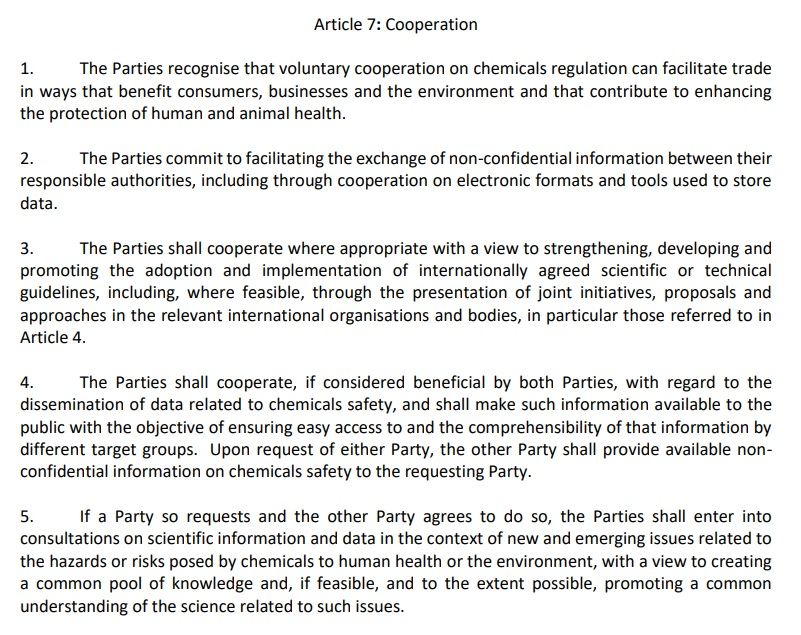While the media on both sides of the English Channel are celebrating the conclusion of a Brexit deal, chemical companies are still trying to find out exactly what the ‘Trade and Cooperation Agreement’ means for them.
Unfortunately, the deal says very little about the chemicals industry at all. Despite its value to both sides (the chemical industry is the UK economy’s second largest part) the word ‘chemicals’ is only written 20 times. Even more significantly, of the deal’s 1,246 pages only two talk specifically about the chemicals sector.

While the deal does acknowledge the UK’s continued participation (for the next six years) in the EU’s flagship programs, such as the Horizon Europe research and innovation project, the agreement largely speaks in general terms. For example, the two sides have agreed on dispute-settlement mechanisms, government aid, and on the rights of businesses and consumers.
This is the second of a two-part article on the Brexit deal and how it relates to the chemical industry. To learn more about this topic read: How the Brexit Deal Looks for the Chemical Industry – Part 1
This was an important goal for the EU, as it keeps the UK from building up any strategic advantage over its larger neighbour. As the EU Commission explains, “[The deal] means that businesses in the EU and the UK compete on a level playing field and will avoid either party using its regulatory autonomy to grant unfair subsidies or distort competition.”
However, failing to be more specific about what the deal means for chemical companies has left many in the industry worried.
Brexit Deal Lacks Detail for Chemicals Sector
In its statement on the deal, the UK’s CIA was pleased that there will be no tariffs on chemical products, but still believes that there is a lot of work still to be done if other trade barriers are to be imposed at a later date.
“We have consistently called for the threat of tariffs to be avoided, so we very much welcome the commitment and hard work from both parties in securing that outcome,” said Steve Elliott, Chief Executive of the CIA. “The Prime Minister has today mentioned chemicals as an industry where we have the potential to do our own thing. With that in mind we need to see, in particular, the extent of regulatory cooperation agreed with regard to the industry’s REACH responsibilities. Failure to secure access to what has been a decade’s worth of investment by UK chemical businesses in data for EU REACH will leave the industry facing a bill of more than £1 billion in unnecessarily duplicating that work for a new UK regime.”

The lack of detail for chemical companies to work with was also highlighted by Marco Mensink, who in an interview with the chemical industry journal ICIS, stated that, “The specific chemical annex seems very thin and falls short of securing data access of UK authorities and companies to the REACH database in Helsinki.”
Looking ahead, Elliot states that, “… all our efforts now must be focused on working with the authorities to deliver a chemicals regulatory regime that is efficient, innovation-friendly and sensitive to international competitiveness. Such an approach will also enable us to provide reassurance over any health and environmental concerns”.
It seems that for the most part, a Brexit deal for the chemicals industry still needs to be completed, as to date the agreement only acknowledges that both sides will aim for “a common pool of knowledge”.
Ultimately, it seems too soon for either UK or EU chemical companies to celebrate. The deal represents only the framework for an agreement, which works for today as the two chemical industries are currently so closely aligned. What will happen over the coming years as the two sectors drift apart is less certain.

“As the EU rolls out the Chemical Strategy for Sustainability,” explained Mensink, “the UK will have to decide if it follows these new legal developments in the EU from the first day the new trade deal is in place. It is likely the two regulatory regimes will differentiate from the start, which is a concern to all of us.”
These decisions are waiting to be made. But for now, chemical companies must remain hopeful that both sides will want to maintain the free flow of goods to help maintain a chemical sector that has been consistently losing ground to its US, Chinese, and even Middle Eastern counterparts.
For as the catastrophe of a ‘No Deal’ Brexit has been avoided, chemical industry executives can stay upbeat.
“Although this Free Trade Agreement represents a mixed bag for our industry, we shouldn’t underestimate the huge value that a deal brings in terms of certainty,” says Elliot. “Chemical businesses all over the UK have proved to be hugely resilient over this most uncertain and challenging of years, and a predictable trading environment with our most important market-place, coupled with emergence from COVID-19, should make 2021 a year to look forward to.”
Photo credit: Amazonaws, Freestocks-photos from Pixabay, DANIEL DIAZ, 8926, Jason Blackeye on Unsplash, Paweł Jagielski from FreeImages, & Griszka Niewiadomski